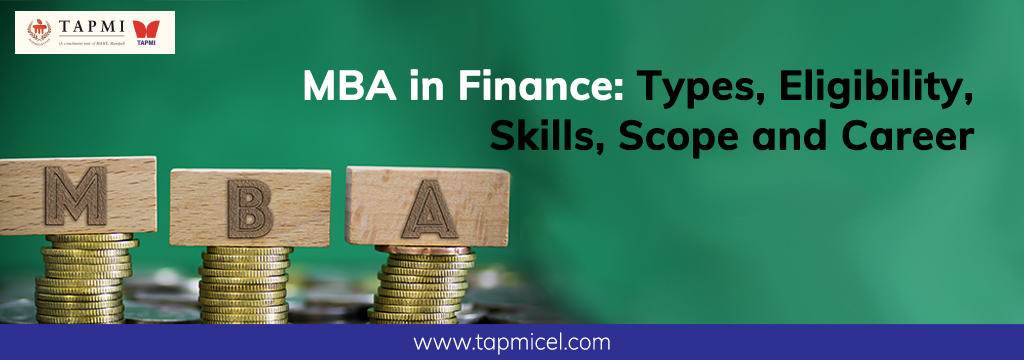No, it is not though it requires an deeper understanding of financial markets which can be gained through proper training during the course.
MBA in Finance: Types, Eligibility, Skills, Scope and Career


MBA in Finance
A two-year postgraduate degree in Finance called an MBA equips students for various management positions in the industry. Students who enroll in the MBA in Finance course receive in-depth training on the many sides of Finance, including management, control, and evaluation of resource collection, investment, and management.
An MBA program focusing on finance is created for individuals who wish to pursue careers in the finance industry. This type of MBA program is typically structured similarly to a traditional MBA but with a greater focus on finance coursework. As a result, students will acquire advanced knowledge in fintech, economics, and investment by the end of the program. In addition to finance coursework, students may also have the opportunity to choose from a range of core and elective subjects, including operations management and leadership skills.
Managing and controlling a company’s financial resources are the main focus of numerous financial specializations. Whether a candidate has prior financial expertise, the Master of Business Administration (MBA) in Finance program offers many prospects. Finance is the study and system of money, stocks, and other financial items.
Who is an MBA in finance for?
Are you considering a career in finance? Are you wondering which degree program is right for you: an MBA or a Master of Finance? The answer relies on your level of experience and how specialized you want your education to be. MBA programs offer a diverse range of management courses, including a finance specialization, while Master of Finance programs focus solely on finance. However, MBA programs are typically geared toward preparing students for more senior roles. So, if you have a few years of experience, an MBA with a finance specialization might be the perfect fit. On the other hand, if you are starting out in your career, a Master of Finance program might be the ideal choice. Both options provide a solid foundation for a successful career in finance, so it’s worth considering which one aligns best with your goals and experience.


Why pursue an MBA in finance?
Pursuing an MBA in finance can provide a range of benefits for individuals looking to advance their careers in the finance industry. An MBA program offers a broad education in business and management, including finance courses, which can give students the skills and knowledge they need to take on leadership roles in finance organizations.
Furthermore, an MBA in finance enables students to specialize in specific areas such as investment banking or financial planning. This specialized expertise enhances graduates’ competitiveness in the job market and prepares them for success in their chosen career paths. Those interested in launching their businesses, particularly in the fintech industry, will find an MBA in finance to be a valuable asset. In summary, pursuing an MBA in finance establishes a robust foundation for a successful and fulfilling career in finance.
Types of MBA in finance courses in India
There are several types of MBA in finance courses available in India. These include:
- Full-Time: These programs are typically two years in duration and are designed for students who want to pursue a full-time career in finance.
- Part-Time: These programs are ideal for working professionals who want to continue working while pursuing their MBA. Part-time programs are usually more flexible and can be completed in three to four years.
- Executive: These programs are designed for executives and senior-level professionals who want to further their careers in finance. Executive MBA programs are usually shorter and more intensive than full-time or part-time programs.
- Online: Online MBA programs offer the convenience and flexibility of studying from anywhere with an internet connection. They are a good choice for students who can only commit to a part-time or part-time program due to other commitments.
- Specialized: Some universities offer specialized MBA programs in areas such as investment banking, financial planning, and risk management. These programs are ideal for students who want to focus on a specific area of finance.
Overall, the type of MBA in finance program you choose will depend on your career goals, experience level, and personal circumstances. It’s important to carefully research and compares different programs to find the one that is well-suited for your needs.
MBA in finance: Eligibility Criteria
An MBA in finance is a graduate-level degree program curated to prepare students for careers in the finance industry. These programs typically cover a range of business and management topics, focusing on finance-related coursework clone watcheself bar 5000 puff disposable bc5000elf bar 600burga phone casecool phone casestelefoonhoesjes zelf maken. In the program’s first year, students will learn about general business subjects such as accounting, marketing, and operations management. In the second year, they will delve into more specialized finance courses such as financial analysis, investment banking, and risk management.
To be eligible for an MBA in finance program, candidates typically need an undergraduate degree in a related field such as BBA, BA, B.Sc, B.Com, or BCA with a minimum average of 50%.


Most business schools offer admission based on scores from entrance exams, although some may offer merit-based admission. There are no age restrictions for MBA in finance programs, although work experience is highly recommended.
Admission to MBA in finance programs may require participation in various national, state, and university-level entrance exams, depending on the school.
Skillsets required for MBA in finance
An MBA in finance is a graduate-level degree program that prepares students for leadership roles in the finance industry. To succeed in this program and their future careers, students should have a strong foundation in business and finance and specific personal skills. Some of the key skillsets required for an MBA in finance include:
- Analytical skills: MBA in finance students should be able to analyze financial data and make informed decisions based on that data. This includes understanding and interpreting financial statements, performing financial analysis, and using financial modeling techniques.
- Communication skills: MBA students should be able to effectively communicate financial information to a range of audiences, including colleagues, clients, and upper management. This includes writing clear and concise reports, presenting financial data clearly and compellingly, and explaining financial concepts to those needing a finance background.
- Leadership skills: MBA in finance students should have the leadership skills to manage teams, motivate employees, and make strategic decisions. This includes inspiring and guiding others, delegating tasks effectively, and making difficult decisions under pressure.
- Problem-solving skills: MBA in finance students should be able to identify and solve complex financial problems independently and as part of a team. This includes being able to think creatively and critically and to develop innovative solutions to financial challenges.
Achieving success in an MBA in finance necessitates a blend of technical expertise and interpersonal skills. Students can proactively cultivate these skill sets to thrive in the finance industry, positioning themselves for success in their academic and professional pursuits.


Subjects in MBA in finance
You will mix broad business management skills with subjects specifically related to finance while pursuing an MBA with a finance emphasis.
This entails studying fundamental disciplines like strategy, operations, marketing, and accounting in addition to a financial syllabus containing both required and optional core MBA finance courses.
Through study excursions, internship possibilities, or the possibility to work on real-world projects while pursuing your MBA in Finance, most business schools also provide you with practical experience in finance. Traveling to major financial hubs like London, New York, or Hong Kong could be part of this, which would enhance your educational experience.
Depending on the school, you can choose from a variety of finance modules. However, most, if not all, MBA in Finance degrees typically include the following finance courses:
- Corporate finance
- Investments
- Valuation
- financial planning
- Mergers and acquisitions
- risk management
- financial data analytics
- Fintech
- entrepreneurial finance
MBA finance syllabus of Top Management colleges in India
The MBA finance syllabus at top management colleges in India is designed to provide students with a strong foundation in business and finance. These programs typically cover various topics, including accounting, economics, marketing, and operations management. In addition, students will take specialized finance courses such as financial analysis, investment banking, and risk management. Some of the critical topics that may be covered in the MBA finance syllabus at top management colleges in India include:
- Financial Accounting: Financial Accounting course deals with the principles of financial accounting, including preparing and interpreting financial statements.
- Financial Management: This course teaches students the principles of financial management, which include financial planning, budgeting, and decision-making.
- Investment Banking: This course covers the principles and practices of investment banking, including the role of investment banks in the financial system, financial analysis, and capital structure.
- Risk Management: This course covers the principles and practices of risk management, including the identification, assessment, and management of financial risks.
Overall, the MBA finance syllabus at top management colleges in India is designed to provide students with a well-rounded education in business and finance. By mastering these topics, students can position themselves for successful careers in finance.


Career opportunities after MBA in finance
With an MBA finance degree, you will have numerous employment opportunities in the financial field, including international finance. In general, the following are the most typical destinations for finance graduates:
- Investment banking
- Corporate finance
- Private equity or debt research
- Risk management
- Financial planning
- Financial services venture capital
- Portfolio management
An MBA will often start as an associate in banking, equities, or debt research.
However, you will not always be assured of entering financial management at an entry-level position. Following their degrees, some MBA finance graduates, for example, find themselves in C-suite roles.
However, it is equally crucial to realize that an MBA opens doors in fields other than finance. You may, for example, combine your specialized financial expertise with another company’s skills, such as leadership, marketing, or operations. As a result, some MBA finance graduates work in:
- Corporate finance marketing
- Financial management
- Fintech startup leadership
- Management consultancy
MBA in finance average salary offered
An MBA in Finance degree can lead to a lucrative career in the finance industry. The average income of a graduate with this degree is influenced by several factors, including the individual’s skills, competencies, accomplishments, and business conditions. MBA Finance graduates often have an advantage in the job market due to the significant growth in the management sector. The average salary for an MBA Finance graduate with 0-1 year of experience is around Rs. 7,00,000 per year, while those with 1-3 years of experience can expect to earn around Rs. 12,00,000 per year. Those with more than 5 years of experience may earn up to Rs. 20,00,000 annually.
How to get admission for MBA in finance management
You must apply to business schools that offer the MBA in finance management program and fulfill certain eligibility conditions in order to be admitted. You normally require an undergraduate degree in a relevant discipline, such as a BBA, BA, B.Sc., B.Com., or BCA with a minimum average of 50%, to be eligible for an MBA in finance program. In order to prove your ability for business courses, you will also need to take an admission exam, such as the Management ability Test (MAT) or the Common Admission Test (CAT).
In addition to work experience, extracurricular activities, and essays or personal statements, some business schools may take them into account during the admissions process. In order to apply, you must gather information about and evaluate several MBA programs in finance, fill out an application, and send in necessary paperwork such as test results and transcripts.
MBA Programs offered by TAPMI Centre for Executive Learning
The TAPMI Centre for Executive Learning is a premier business school in India that offers a range of MBA programs. One of these programs is the MBA in Banking and Financial Services (MBA-BKFS), which is designed to prepare students for leadership roles in the banking and financial services industry.
This program covers a range of topics, including financial accounting, financial management, investment banking, and risk management. It enables students to apply their knowledge to a real-world business problem through interactive pedagogical methods.
The MBA-BKFS program is designed for working professionals and offers a flexible format that allows students to continue working while pursuing their degrees. It is a two-year program that includes online coursework. Overall, the MBA in Banking and Finance program at the TAPMI Centre for Executive Learning is an excellent choice for those looking to excel in their careers in the banking and financial services industry.
FAQ:
Is MBA in finance difficult?
Is An MBA In Finance Degree Right For You?
Yes, if you are looking to carve a lucrative career in banking and financial sector.
What is the fee of MBA in Finance Management?
Depends on the college and type of course. Online courses range from INR 60,000 to 2,00,000.
What is the starting salary after MBA in Finance Management?
The average starting salary for freshers is around 5-6 LPA.
Is MBA in Finance difficult as compared to other MBA specialisations?
MBA in Finance is just as demanding as any other MBA program. However, because Math and Statistics are used more frequently, some students may find it tougher than other specializations.
What is the duration of MBA in Finance Management?
It is typically around two years.
Which are the Best MBA colleges in India for banking and finance?
TAPMICEL is one of the best MBA colleges in India that offers MBA in Banking and Finance courses online for working professionals and those interested in starting a career in the banking and finance industry.
Where I can apply for a job completing MBA in Finance Management?
Top talent from the best business schools is recruited by giant firms and rewarded generously. Some top recruiting organizations are Morgan Stanley & Co, BCG, Bain and Company, Mckinsey, KPMG, The Deutsche Bank, etc.
